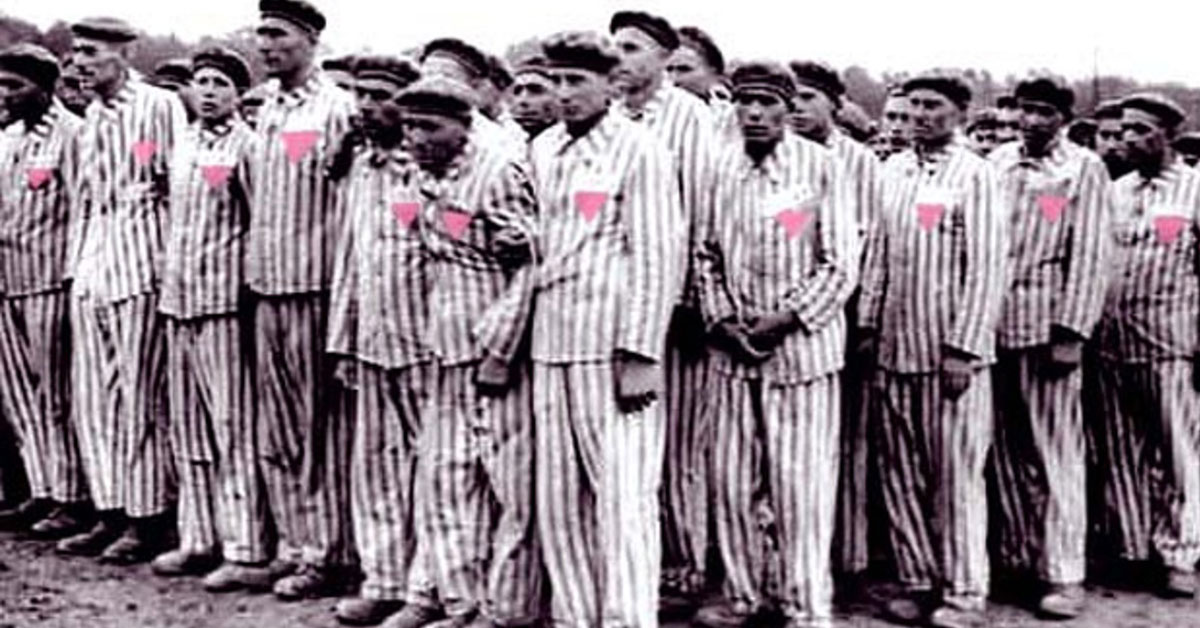German Parliament remembers queer victims of the Holocaust

Queer people were forced to wear a pink triangle in Nazi concentration camps to indicate their sexuality
The German Parliament has for the first time focused on honouring the tens of thousands of queer victims of the Nazis to mark the annual International Holocaust Remembrance Day.
Held every 27 January, on the date when the Auschwitz concentration camp was liberated in 1945, it commemorates the 6 million Jews and the millions of other minority group victims of the Holocaust who were killed or held in concentration camps by Nazi Germany.
After twenty years of campaigning by activists, the Bundestag (German federal parliament) finally held an official ceremony on Friday dedicated to the queer Holocaust victims who are often forgotten.
“Today’s hour of remembrances focuses on a group of victims who had to fight for a long time to achieve recognition: people who were persecuted by the National Socialists because of their sexual orientation or their gender identity,” said Baerbel Bas, president of the lower house of the Bundestag.
It’s believed that more than 57,000 homosexuals were arrested by the Nazi regime between 1933 and 1945.
“More than half of these men were convicted, usually to serve long prison sentences or forced labour. In some cases, men were forced to undergo sterilisation. Many were driven to suicide,” said Bas.
“The hardest hit were the many thousands of men and women who were deported to concentration camps because of their sexuality – usually under a pretext. Many were abused for medical experiments, most perished after only a short time or they were murdered.”
As many as 10,000 queer people are thought to have died as a result of murder, ill-treatment or starvation in Nazi concentration camps, where they were forced to wear a pink triangle to indicate their sexuality.
Bas noted that while most of the victims were gay men, “lesbian women were by no means safe from persecution. Neither were people who could not or did not want to live as the gender society demanded of them.”
“We gays were like hunted animals…”
The organisers of another commemoration held at the SchwuZ Queer Club in Berlin also acknowledged that “Only recently have the lesbian victims been commemorated”, and that “Little is known about the persecution of trans people”. They added that “The persecution took different forms, but each individual case is tragic and testifies to horrors that are often hard to imagine.”
In 2011, Rudolf Brazda, the last-known remaining gay holocaust survivor of concentration camps, died in his sleep in the French town of Bantry at the age of 98. “We gays were like hunted animals,” Brazda recalled before his death. “Wherever I went with my companion the Nazis were always already there.”
In 1937, the head of the SS Nazi armed wing, Heinrich Himmler, described the killing of homosexuals as “the extinguishment of abnormal life. It had to be got rid of, just as we pull out weeds, throw them on a heap, and burn them.”
He added: “This is not out of a spirit of vengeance, but of necessity; these creatures must be exterminated.”
Over the years, as awareness of the queer Nazi victims has grown, LGBTQ holocaust memorials have been erected in cities such as Amsterdam, Berlin, San Francisco, Sydney and Tel Aviv.
Leave a Reply